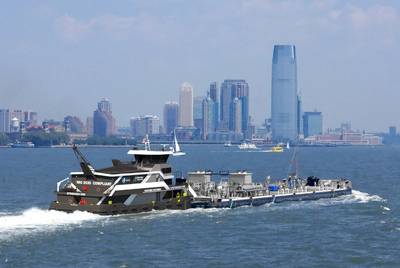ACBL to Operate Maritime Partners' Innovative Hydrogen One Towboat
Jeffersonville, Ind.-headquartered marine transportation company American Commercial Barge Line (ACBL) is expected to operate Hydrogen One, a first-of-its-kind towboat that will run on emissions-reducing methanol-to-hydrogen generator technology—without diesel propulsion.
The groundbreaking vessel is being developed by Louisiana-based Maritime Partners, the U.S.' largest lessor of marine equipment, and will be built by Intracoastal Iron Works in Bourg, La. for launch in 2023 as the maritime industry continues to plot its course toward cleaner vessel operations.
“Our industry must be diligent and innovative to keep our standing as the most efficient mode of cargo transportation for our customer base,” ACBL's CEO, Mike Ellis told Marine News. “We are excited to be a key player in developing a more sustainable reduced carbon footprint supply chain for our customers and all of our stakeholders through our partnership with Maritime Partners on this project.”
Hydrogen One's propulsion system, which relies on e1 Marine's reformer technology to essentially convert bunkered methanol into pure hydrogen on demand, will emit no nitrogen oxide (NOx), sulfur oxide (SOx) or particulate matter (PM) pollution. The hydrogen will run through fuel cells, creating electricity for the vessel’s motors, which drive dual L-drive azimuth thrusters
While pure hydrogen can be difficult to carry in quantity and get distance, methanol—which is readily available and routinely carried on U.S. inland waterways—is very similar to fueling conventional diesel, said Mike Complita, principal in charge and VP of strategic expansion at Elliott Bay Design Group (EBDG), the Seattle-based firm that designed the vessel.
"Methanol, in my opinion, is probably the safest alternative fuel to transfer to the vessel beyond diesel and biodiesel," Complita said. "You bunker it from a truck or a terminal through a hose. It does not take any special permitting, unlike hydrogen and ammonia and some other alternative fuels."
RIX Industries has been tapped to manufacture Hyrdogen One's M18 reformers and PowerCell Sweden AB will supply the PowerCellution Marine System 200 fuel cells. The vessel will also be equipped with batteries that provide additional power when needed, both while underway and for hotel power.
Equipped with ABB’s electrical power distribution and automation technology, Hydrogen One will be able to perform at standard operational speeds for up to 550 miles before it needs to refuel. It will meet the International Maritime Organization’s (IMO) 2030 goals, which target 40% reduction in greenhouse gas (GHG) emissions relative to 2008. The vessel will also meet all requirements of the U.S. Coast Guard’s Subchapter M regulations.
Once Hydrogen One is completed, ACBL will likely use the towboat to move petroleum products in and around Louisiana and Texas. Increasingly, barging customers are seeking ways to remove emissions from their supply chains.
“This project aligns with our strategy and ESG goals and initiatives,” Ellis said. “We have to find more sustainable solutions to meet our customer demands.”
- Read the full feature story on the groundbreaking vessel in the August edition of Marine News magazine.













